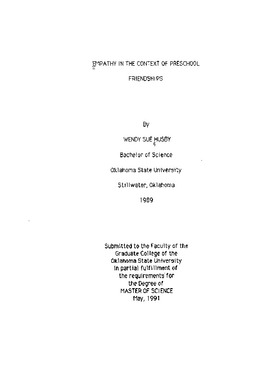| dc.contributor.author | Husby, Wendy Sue | |
| dc.date.accessioned | 2014-12-08T16:56:02Z | |
| dc.date.available | 2014-12-08T16:56:02Z | |
| dc.date.issued | 1991-05-01 | |
| dc.identifier.uri | https://hdl.handle.net/11244/13727 | |
| dc.description.abstract | Sixty hours of observations were conducted in three preschool settings to examine 4-year-olds' spontaneous empathic responses to their crying peers. Children's responses to distressed peers were recorded into a microcassette player and later transcribed onto paper. A sociometric assessmentwas given to each child to determine their friends and social status. It was expected that the popularity of children and the number of reciprocal friendships would predict empathic behavior. Also, it was expected that the presence of a teacher would predict the frequency of empathic behavior. The statistical analyses showed that popularity, reciprocal friendships, and teacher absence did not predict higher frequencies of empathic behavior; however, qualitative observations showed that young children did behave empathically to their peers. Often, teachers responded so quickly to distress that chlldren did not have a chance to initiate empathic responses, and further, may not have felt responsible to do so. | |
| dc.format | application/pdf | |
| dc.language | en_US | |
| dc.publisher | Oklahoma State University | |
| dc.rights | Copyright is held by the author who has granted the Oklahoma State University Library the non-exclusive right to share this material in its institutional repository. Contact Digital Library Services at lib-dls@okstate.edu or 405-744-9161 for the permission policy on the use, reproduction or distribution of this material. | |
| dc.title | Empathy in the Context of Preschool Friendships� | |
| dc.type | text | |
| osu.filename | Thesis-1991-H968e.pdf | |
| osu.accesstype | Open Access | |
| dc.description.department | Family Relations and Child Development | |
| dc.type.genre | Thesis | |
